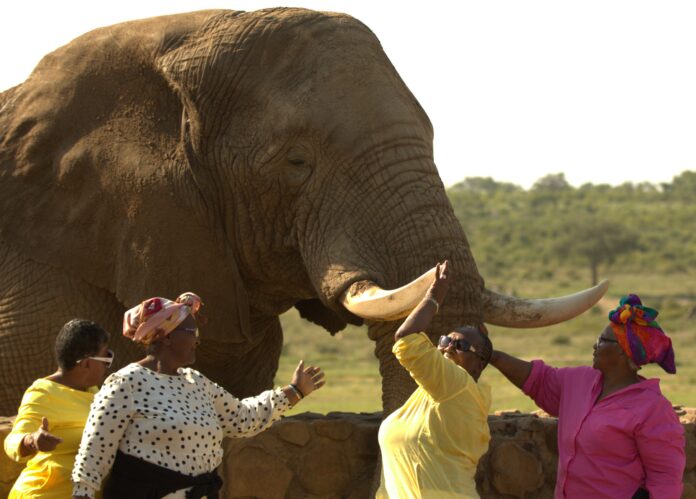Every year thousands of African animals are poached, with criminal syndicates selling the spoils of their slaughter abroad. Along with rhinos and pangolins, African elephants are among the continent’s most poached animals, with around 20 000 killed annually. With just over 400 000 African elephants left in the wild, the species could be all but wiped out within our lifetimes.
While international crime syndicates run most of the poaching rings, they seldom do the actual killing themselves. Instead, they typically pay members of impoverished communities to do so for them, coming in to collect the ivory afterwards. Some communities are all too happy to rid themselves of creatures they see as competition for their grazing animals and a threat to their crops and homesteads. While such attitudes may not be as common as they once were, the involvement of local communities in poaching underlines how important it is to empower them to conserve the surrounding natural world instead.
Wildlife is, after all, an important part of the natural heritage of these communities. Unfortunately, many people who live within the communities surrounding wilderness areas have been separated from that heritage by fences, urban development, and poverty (which means they cannot afford to get into reserves and national parks). With the right interventions, however, the relationships between communities and wildlife can be re-established.
A once-in-a-lifetime opportunity
How rapidly those connections can be re-established was made abundantly clear when a group of grandmothers (popularly referred to as ‘gogos’) were given a once-in-a-lifetime opportunity to have a close encounter with elephants. The encounter, which was organised by Elephants Alive in partnership with Relate Bracelets, took place at Elephants Alive’s Limpopo facility, with the gogos coming from Cape Town.
“Taking our gogos to experience the majestic elephants with Elephants Alive was a profound moment of connection and transformation,” says Dalit Shekel, CEO of Relate Bracelets. Witnessing the powerful interaction between the gogos and the elephants, both matriarchal figures, was like a meeting of wisdom and grace. “Our gogos saw firsthand the impact of their work, understanding how every bracelet contributes to preserving these magnificent creatures.”
Where the Gogos possibly once feared the elephants, they left feeling as though they were friends, highlighting the incredible bond that can be formed between humans and nature. “This experience is not just a memory but a story to inspire generations, a testament to the importance of conservation and community empowerment. We are grateful for our partnership with Elephants Alive, and the opportunity to build a legacy that unites people with nature’s incredible wisdom,” continues Shekel.
That sense of awe was confirmed by Mercy Ntombizanele Jozana, one of the gogos who called it a memorable experience that will remain with her for the rest of her life. “I learnt that animals are not the enemy to human beings but loving creatures. Also, we can have a special bond and relate with nature and animals,” she says.
“Like the elephants we study who see the older individuals within their societies as repositories of knowledge and of great value to their families and societies, we pay tribute to the gogos,” says Dr Michelle Henley, CEO of Elephants Alive and founder of the Ndlopfu Gogo Programme working with co-founders Joel Sithole, Ronny Makukule and Tinyiko Masia. “As with elephant matriarchs, they are the pillars of society. We celebrate our partnership with Relate whose bead-for-bead initiative has made a difference to the lives of elephants and the Gogos we love by offering us financial support”.
Whether it’s a gogo patiently beading a Relate bracelet, a forgotten gogo looking after her grandchildren, or a gogo we take to meet the elephants, it makes no difference to the impact this programme is having. “The journey has been honourable, humbling and heartwarming! What a way to celebrate this special World Elephant Day, together, we represent the strength of collaborating, female-lead organisations and societies,’’ continues Henley.
Mutually beneficial relationships
These kinds of encounters, as well as partnerships like Relate and Elephants Alive’s, are critical because they demonstrate how driving positive connections between communities and wildlife can be mutually beneficial.
Outside of the direct conservation benefits, these partnerships and initiatives are also a chance to underline how conservation can empower communities. There are obvious ways in which it does so. Wildlife tourism, for instance, adds approximately US$48 billion to African economies annually. But there are less obvious benefits too.
Biodiversity is central to the livelihood of human beings, as biodiversity provides for the health of the environment on which we rely for food, fuel, shelter and more. Educating these communities about conservation helps ensure the sustainable use of these resources, which is critical for their long-term wellbeing. Wild animals also play a significant role in ecological processes. By understanding the importance of these processes, communities can contribute to maintaining ecological balance and preventing environmental degradation.
Additionally, many communities have cultural and social ties to wildlife. Conservation awareness can help preserve these cultural practices and promote a sense of pride and responsibility towards protecting natural heritage.
Empowerment matters
None of those benefits will be realised, however, if communities aren’t empowered to have direct, conservational relationships with wildlife in the areas they live in. Get those empowered connections right, on the other hand, and the rewards could be far bigger than any poaching syndicate could ever offer.

